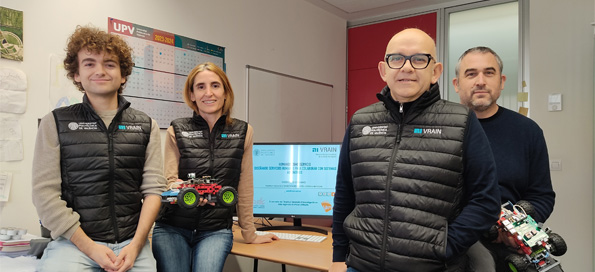HaaS Project
A UPV team investigates how people will work with intelligent systems.
[ 30/01/2024 ]
A team from the Valencian Institute for Research in Artificial Intelligence (VRAIN) of the Universitat Politčcnica de Valčncia (UPV) is developing tools and methods to train people in skills or services needed for fruitful collaboration with intelligent systems, such as autonomous cars, factories or smart homes, and even to formally define the jobs of the future. This development is included in the HaaS project (Human as a Service; designing human services to collaborate with autonomous systems), which aims at a paradigm shift by focusing on the human in the machine-human relationship.
The "human as a service" approach seeks to enable humans to act as services, performing specific tasks that complement the functionality of intelligent systems. In this way, the project will achieve a common language and conceptual framework for designers and developers of human-machine collaboration.
Description of the services
The team of the VRAIN Institute of the UPV that is carrying out this project, which began in 2022 and will conclude at the end of 2024, is formed by the researchers Antoni Mestre, Miriam Gil, Joan Fons and co-lead this project Vicente Pelechano, and Manoli Albert, also part of the team.
Vicente Pelechano, a researcher at VRAIN Institute, explained: "The approach does not seek to dehumanise, robotise or turn people into software systems. The idea is to properly profile the people who will work with these systems and describe the services they can offer to intelligent systems so that they can collaborate with those who can meet their requirements".
Jobs of the future
With a specification of human services, "we could even formally describe future jobs. In addition, these human services are necessary to adequately describe what each one (human and system) has to perform, execute or do to carry out a complex task, for example, in a factory or driving an autonomous vehicle," emphasises Manoli Albert.
The most innovative aspect of this project, with a "human as a service" approach, "is the description of the services that humans provide to intelligent systems to achieve a fruitful collaboration that allows 100% of tasks to be carried out in collaboration between humans and machines", points out Vicente Pelechano, a researcher at the UPV's VRAIN Institute.
Outstanding news
 The Diamond Army
The Diamond Army
Two students came up with the UPV initiative that has engaged more than 1,600 volunteers and shattered the false myth of the 'crystal generation'
 ARWU 2024
ARWU 2024
The Shanghai ranking reaffirms the UPV as the best polytechnic in Spain for yet another year
 Distinction of the Generalitat for Scientific Merit
Distinction of the Generalitat for Scientific Merit
Guanter has been distinguished in recognition of his research excellence in the development of satellite methods for environmental applications
 The new statutes come into force
The new statutes come into force
The Universitat Politčcnica de Valčncia is the first university in Spain with statutes adapted to the new LOSU
 NanoNIR project against breast cancer
NanoNIR project against breast cancer
UPV Researcher Carla Arnau del Valle receives an EU Marie Curie grant to develop biosensors for the early detection of this cancer
 Large artificial intelligence language models, increasingly unreliable
Large artificial intelligence language models, increasingly unreliable
According to a study by the Universitat Politčcnica de Valčncia, ValgrAI and the University of Cambridge, published in the journal Nature





